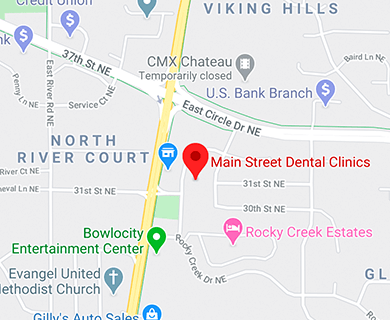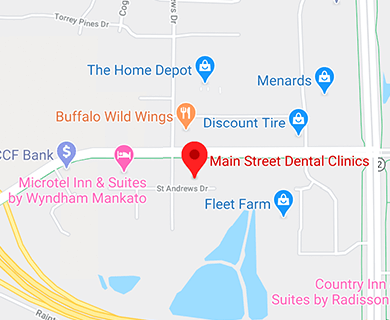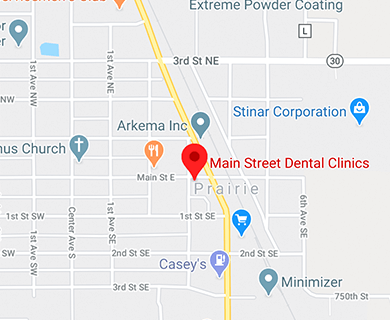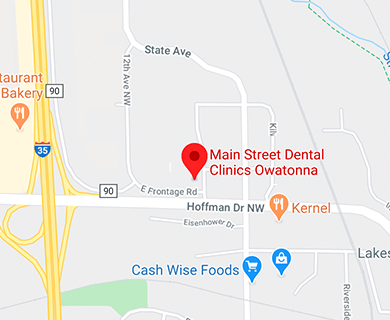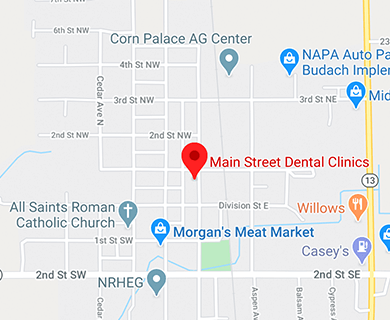One-third of the U.S. population has skipped out on necessary dental treatments or preventive care due to anxiety or fear of going to the dentist. Are you one of the millions of Americans that avoid the dentist out of anxiety or embarrassment? Just know that you're not alone!
Dentists have heard and seen it all and are prepared to walk you through your worries, anxiety, and concerns in order to get you the care you need. The doctors at Main Street Dental take your comfort especially serious. But, you don't need to take our word for it. See what our patients say about the care we provide:
Besides having a caring and professional dental team on your side, it's comforting to realize what your dentist is really thinking during your appointment and that you have no reason to feel embarrassed.
4 Things Your Dentist Is Thinking During Your Dental Exam
Fear of pain and of being judged are usually at the top of the list of reasons that keep otherwise rational and health-conscious adults from going to the dentist. Despite the fact that the American Dental Association (ADA) strongly recommends a dental exam and professional cleaning every six months to a year to maintain your oral health and prevent tooth decay and gum disease, many people skip going to the dentist until something goes wrong. In extreme cases, dental phobias are so strong that people choose to live with pain, which can lead to serious oral and even bigger health problems.
But the good news is that it's never too late to go to the dentist, whether your last appointment was three, 10 or even 30 years ago!
If you are afraid that your dentist might judge you and your dental habits, remember that dentists are trained professionals whose career and livelihood revolves around helping you get the dental care you need.
Here are a few things dentists wishes you knew about what they're really thinking during your appointment.
1. They can tell if you've been flossing (so don't bother lying about it).
Dentists do not have a crystal ball that magically lets them in on your oral hygiene and lifestyle habits — your gums tell them everything they need to know. Rather than feeling guilty or embarrassed about the fact that you have been neglecting regular flossing, schedule an appointment for a checkup and cleaning to get an accurate assessment of your oral health, and go from there. Good oral hygiene habits do not have an expiration date — you can start any time.
While you're likely to hear the consequences of not flossing from your dentist, here's a quick reminder of what can happen if flossing isn't part of your dental hygiene routine:
- bad breath
- gum disease
- cavities
- tooth loss
- weight gain
- pneumonia
If you're concerned about your dentist noticing the lack of flossing you've been doing, just floss! It's not too late to start.
2. They wish you had come in sooner.
The longer you put off dental treatment, the more damage you are likely to have by way of tooth decay or gum disease. As medical professionals, dentists want what is best for your teeth and gums, and they are strong advocates of preventive treatment.
You may even be someone who takes care of your smile diligently; however, going to the dentist regularly is still essential for the health of your entire mouth. Dentists can detect problems that you might not see or feel. If you visit the dentist regularly, they will be able to take measures to prevent the problem from progressing. If you wait too long, there will be more time and money involved in fixing the issue.
Normally, people can get away with visiting the dentist twice a year. There are some groups of people, however, who should consider seeing the dentist more often. High-risk groups include:
- pregnant women
- smokers
- people with gum disease
- diabetics
- people with weak immune systems for bacterial infections
- people who are prone to getting cavities or plaque buildup
Don't put off seeing the dentist before it's too late. Visiting your dentist every six months will save time, money, and pain.
3. They wish you'd kick your smoking/sugar/alcohol habit.
The things that are bad for your general health are also bad for your teeth and gums. In addition to brushing and flossing every day and going in for preventive dental treatment, a healthy diet low in sugar and alcohol (and no smoking!) is also an important factor in your oral health. You may already know that eating and drinking too much sugar can lead to cavities, but alcohol dries out your mouth, limiting the flow of saliva that is essential to neutralizing harmful oral bacteria.
Smoking is proven to be damaging to your body, including to the health of your mouth. Smoking can lead to stained teeth, gum disease, tooth loss, and even mouth cancer. Smokers may find that they have bad breath more often than non-smokers. A short-term solution to this would be mouthwash to kill the bacteria in your mouth. Although, it won't cure the bad breath or any other oral ailment.
4. They're not here to judge you.
As health professionals, dentists aren't interested in judging you or making you feel bad. All they really care about is your oral health. Rather than worrying about what they might think of you on a personal level, think of dentists as partners who are on your side and working to protect your oral health.
The most important goal the doctors at Main Street Dental Clinics have is to provide comfortable and quality dental care to all patients. No set of teeth will come as a surprise to them. If it's been a while since you've seen the dentist, and you're in the southeast Minnesota area, request your FREE dental exam and X-rays here!



